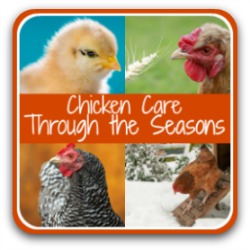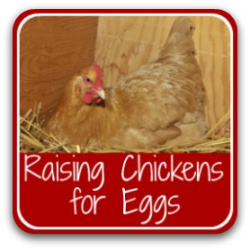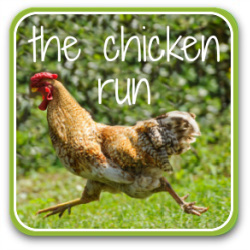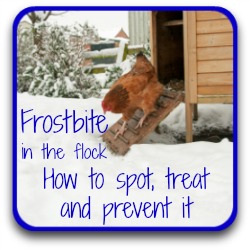- Home
- Monthly care
- July
Raising and caring for chickens in July.
20 to-dos to keep your flock healthy and happy in the heat of the summer.
July in the chicken coop. The weather is heating up, and heat is much less tolerable for chickens than cold.
Chickens need help during this time, and it's our job to make sure we give it. Which is what this month's tasks are all about.
If you've followed along with this series, you'll know that we actually began preparing for this in May, when we dealt with the importance of shade and dust baths.
In June, we looked at the critical signs of heat exhaustion, and the importance of ventilation in the coop.
If you've not read those articles, I'd suggest it would help to do that now. It will better prepare you for July and August.
This month, we need to make sure we're vigilant and able to give our flock the best possible chance of getting through the sweltering days without problems.
Here's what I cover this month - click on whichever you want to know about, or read them all!
Want my monthly checklist?
It's available for free to everyone who's subscribed to my website and "Chicken Digest" newsletter.
You'll receive a similar checklist every month in my weekly newsletter.
Check the tasks off online, or print it out to carry into the coop with you!
Note: Links in this article are "affiliate links", which means that if you click and buy something, I earn a small commission at no extra cost to you.
1. Treat to beat the heat!
If you're in the northern hemisphere, the heat is seriously increasing this month. Chickens are excellent at keeping themselves warm in the winter, but far less good at cooling off when the heat strikes.
So keeping your chickens cool and hydrated should be the main focus for the month.
What to do.
1. Make some frozen treats. They're simple and fun to do, and kids love to help. The water content helps hydrate the chickens as they peck at it. Find a "recipe" for the ultimate frozen treat by clicking this link.
2. Fill a stoneware bowl like this one (plastic is not good in the sun; metal heats up too quickly; rubber is fine but needs to be food grade, otherwise it leeches into the water) with ice cubes.
Add water and some frozen fruit treats: frozen blueberries work well, as do lightly frozen melon or watermelon cubes. Again, the flock gets cool water as they dunk for the treats.
And it keeps them occupied for hours!
3. Mint is scientifically proven to be a cooling agent.(1, 2) Add some crushed leaves to a bowl of iced water to refresh your flock.
4. Electrolytes are a good way of rehydrating your flock quickly and inexpensively.
In this article you'll find a recipe for a simple electrolyte drink, made from items you're likely already to have in your store cupboard.
Make sure you have everything in stock before you need it.
5. Do not use high protein treats or apple cider vinegar during hot weather. They increase the metabolic rate which means your chickens warm up. That is exactly what they need to avoid.
2. Get rid of flies - naturally.
It's one of the bugbears of summer: flies in the coop. Not just flies, but other unpleasant bugs too – mosquitoes and gnats are a particular issue here in Italy.
They're not just an unpleasant nuisance – they can transmit disease(3) and cause flystrike. The last thing you want is an outbreak of either of those in the coop.
If, like me, you don't want to use chemical sprays around your chickens, consider some of the natural alternatives.
 Lavender is easy to grow as a fly deterrent, with the bonus that it attracts bees.
Lavender is easy to grow as a fly deterrent, with the bonus that it attracts bees.What to do.
6. Lavender is a versatile plant, useful around the house as well as the coop. Find out more about using it as aromatherapy for chickens, as well as a fly deterrent, in this article.
7. A build up of poop will attract flies, so make sure your coop is kept spotlessly clean all summer.
Consider using sand in the summer coop instead of more traditional bedding like straw. I use it each summer and there's no doubt at all – it keeps flies to a minimum.
8. Lemongrass is really easy to grow, and a known bug deterrent as it contains citronella. As a bonus, chickens love to eat it. Plant in pots outside the coop, and dry the leaves to scatter in nest boxes.
9. Citronella essential oil is a strong oil, distilled from different types of lemongrass leaves. It's been scientifically proven to have a "high effectiveness" at repelling mosquitoes(4).
So if you don't have the time or space to grow the plant, try using the oil instead.
10. There are many positive reviews online for red top fly traps.
Personally, I prefer not to use these (or any other kind of fly trap). When I tried one, I was convinced it attracted more flies than I'd ever had in my coop. It filled within a day, absolutely stank, and eventually had to be buried even though the plastic is not biodegradable.
It was disgusting.
My bottom line advice is to use a combination of sand as a bedding and herbs or essential oils instead. Much more pleasant, and effective at prevention. Of course, these natural remedies do not kill the flies.
I have a much more detailed article about keeping flies out of the coop, here.
3. Help hens lay better eggs.
We're at the height of the egg-laying season now, and hens can need a little help to make sure their systems are given support to lay good quality eggs without depleting their resources.
Laying hens need between 2.5% and 3.5% calcium in their diet to produce strong egg shells. If they don't have enough, their body takes calcium from their bones, making them prone to the chicken form of brittle bone disease.
Chicks you hatched earlier in the year may also be coming into lay, so it's time to change their feed.
What to do.

11. Make sure all your hens are on the right feed. Here's an article which will make sure you're giving them the best possible start to their laying life.
12. Also make sure there's a supply of oyster shell freely available to all hens over the age of about 18 weeks. Find out more in this article.
13. Some people use the hens' own eggshells as added calcium. It's important if you want to do this that the shells are not just crushed, but cleaned and treated. The last thing you want is your flock getting a taste for their own shells.
Clean the shells thoroughly and then bake them in the oven. Grind to a fine powder before offering to the flock.
To be effective, you need to be sure that your hens' eggs have strong eggshells. If they're already lacking in calcium, feeding those shells back to them will not be enough.
Offering oyster shell in a separate bowl means you can be sure they're getting enough calcium.
4. Watch those roosters!
If you hatched last year and you had, and kept, one or more males, they'll be coming to maturity about now.
Hormones kick in, and those previously cute little chicks are starting to do what they're meant to do: protect their flock.
 My Speckled Sussex x Black Copper Marans rooster, aged one week and one year.
My Speckled Sussex x Black Copper Marans rooster, aged one week and one year.They've probably already started to crow – how are the neighbours taking that?!
They'll also begin to look for things to protect their ladies from. Which may well include you.
What to do.
14. The most effective deterrent for an aggressive rooster which has always worked really well for me is very simple.
A hosepipe.
Using it to spray water at an approaching aggressive male doesn't harm the bird at all. But they don't like water and will avoid it wherever possible. I only have to pick up the hosepipe I keep near my chicken run door and my roo runs for his life.
15. Don't ever hold a rooster upside down by his legs as a punishment. It's cruel, unnecessary and it does not teach him anything.
I sometimes hold my little Sablepoot rooster upside down in my hand if he tries to attack me. He's small enough to do that while supporting his back.
It does have the effect of subduing him for a day or so, but then his little brain forgets and off he goes again...
 Bono, my Sablepoot rooster, sometimes needs teaching a lesson – but soon forgets!
Bono, my Sablepoot rooster, sometimes needs teaching a lesson – but soon forgets!16. Look out for the warning signs that a rooster is about to attack, and take action before he does.
You'll see a lowering of the head, and / or shaking it from side to side. At the same time the feathers around his neck will stand on end as he makes every attempt to make himself look bigger.
He may stamp the ground, and almost immediately after that he'll begin to run at you. That's the time to get the hosepipe out!
17. See this article for more information about why a rooster is a great addition to your flock.
See this one to see why it might not be right for your family.
5. Enjoy 4th July - safely.
It's July, and in the US that means one thing: Independence Day celebrations. Which is a great event for humans but can be frightening and even life-threatening for animals and livestock.
Chickens are creatures of habit, and anything that disturbs their everyday routine is a source of stress.
Fireworks and other loud noises can seriously harm poultry. A "banger" firework carelessly thrown over a wall once hit and killed one of my flock.
And stress is known to be one of the causes of Sudden Chicken Death Syndrome.
So it pays to think about your chickens and how they might react to fireworks and partying before it happens.

What to do.
18. Plan to keep your flock in the coop for the day. They may not like it, but better that than harmed by fireworks.
19. Having a 4th July party at your home? As well as keeping your chickens out of harm's way, make sure your guests stay away from them.
An important part of good husbandry is keeping possible sources of disease away from your flock, and allowing visitors to trample over your run is potentially inviting trouble.
20. Do not, on any account, allow fireworks to be set off, or bonfires or barbecues to be lit, anywhere near your coop. Sparks from either can ignite straw in a chicken house very quickly.
And that could spell total disaster for your flock.
If this article helped, you may also like these.
Sources.
A lot of "facts" you'll find on the internet are often people's individual views, often based on inaccurate information repeated from poor quality sources.
The information I provide in this article and others is based not just on my own experience, but on evidenced facts from scientific, peer-reviewed research and evidence from highly respected and experienced poultry keepers such as Gail Dammerow.
Some of the sources I have used are these.
1. Ghosh, Anwesha: Why menthol chills your mouth when it's not actually cold. Pub. The Conversation, 2015.
2. Fernandez et al: Voltage and cold-dependent gating of single TRPM8 ion channels. Pub. US National Library of Medicine, 2011.
3. Bahrndorff, S, et al: Foodborne disease prevention and broiler chickens with reduced Campylobacter infection. Pub. Centers for Disease Control and Prevention, 2013.
4. Kim, J-K, et al: Evaluation of repellency effect of two natural aroma mosquito repellent compounds, citronella and citronellal. Pub. Entomological Research, 2005.
- Home
- Monthly care
- July














